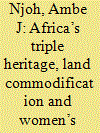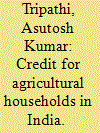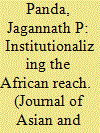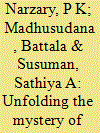|
|
|
Sort Order |
|
|
|
Items / Page
|
|
|
|
|
|
|
| Srl | Item |
| 1 |
ID:
155166


|
|
|
|
|
| Summary/Abstract |
Women have less access to land than men in Africa. Previous analyses have typically identified African indigenous culture as the problem’s exclusive source. With Cameroon, Kenya and Sierra Leone as empirical referents, an alternative explanation is advanced. Here, the problem is characterized as a product of Africa’s triple heritage, comprising three main cultures, viz., African indigenous tradition, European/Christianity and Arabia/Islam. The following is noted as a major impediment to women’s access to, and control of, land: the supplanting of previously collective land tenure systems based on family or clan membership by ‘ability-to-pay’ as the principal determinant of access to land.
|
|
|
|
|
|
|
|
|
|
|
|
|
|
|
|
| 2 |
ID:
155168


|
|
|
|
|
| Summary/Abstract |
Why has the share of non-institutional finance sources for agricultural households not come down between 2002 and 2012? Is the dependency on non-institutional sources the same across farm size classes? Who are the major beneficiaries of the revival in agricultural credit in the 2000s? Are larger farmers becoming more productive and commercial thus requiring higher levels of credit? Are small farms becoming unviable, making it difficult for banks to finance them? This paper examines these issues empirically based on data from the Situation Assessment Survey (SAS) of Agricultural households and the All India Debt and Investment Survey (AIDIS) conducted by the National Sample Survey Organization (NSSO) in its 59th (i.e. 2003) and 70th round (i.e. 2013) and various publications from the Reserve Bank of India (RBI).
|
|
|
|
|
|
|
|
|
|
|
|
|
|
|
|
| 3 |
ID:
155171


|
|
|
|
|
| Summary/Abstract |
China and India have for quite some time been participants in African politics and have employed persuasive strategies to make their presence felt in that continent. The main objective of their current participation and presence in Africa is to exploit energy resources and establish greater political connections there. The Chinese strategy is to be generous with loans and financial aid; the Indian strategy has been to employ populist and democratic measures, highlighting its historical and cultural connections with Africa. Pursuing stronger bilateral relations with African countries has been the principal medium of their continental reach. But bilateral bonding has been taking a backseat recently in their approach vis-à-vis multilateral relations, for which institutional and organisational bonding is being used as the prime medium. South Africa is a conspicuous illustration of this approach. Both China and India share strong bilateral ties with South Africa, which is the frontier state for their outreach to Africa. Their engagements with that country through multilateral forums like the AU, BRICS, BASIC and IBSA exhibit how multilateralism is becoming for them a leading approach relative to bilateralism. Their objective, besides enriching and influencing their bilateral understanding with that country, is to achieve their global ambitions and objectives in tandem with the African continent on a whole. This paper examines the instrumental approach that the two countries employ towards Africa where multilateralism is becoming a prime channel of contact over bilateralism. To what extent this approach has advanced their strategic interests in Africa commercially and politically also needs analysis.
|
|
|
|
|
|
|
|
|
|
|
|
|
|
|
|
| 4 |
ID:
155169


|
|
|
|
|
| Summary/Abstract |
This article provides a comparative analysis of the political economy of Chinese and Indian economic engagement strategies in Nigeria. It argues that although China is becoming increasingly prominent in Nigeria partly because of its state-led economic engagement strategy, India’s private sector-led engagement strategy chimes with Nigeria’s neoliberal economic reforms. However, the article maintains even though both Chinese and Indian strategies are not mutually exclusive to either of the two giants in the pursuit of their interests on the continent, African leaders and policymakers need to develop more strategic engagement plans in their dealings with China and India.
|
|
|
|
|
|
|
|
|
|
|
|
|
|
|
|
| 5 |
ID:
155165


|
|
|
|
|
| Summary/Abstract |
This article uses Edward Said’s post-colonial framework to analyze India–United States (US) nuclear security relations in the post-Cold War period as a clash of US Orientalism and India’s nuclear sovereignty as a key marker of India’s post-colonial essence. Through an analysis of the discourses of India and the US with regard to India’s May 1998 detonation and the 123 Agreement, it explores the following questions: To what extent has America’s security relationship with India been characterized by Orientalist discourses? Does the revision of the US post-9/11 security relationship with India as evidenced through the 123 Agreement indicate continuity or change in America’s Orientalist discourses vis-à-vis the nuclear policies of the Indian state? How has this shaped India’s nuclear nationalism? In exploring these questions, it will be argued that US security discourses reflective of Orientalism have constructed India along Orientalist lines; have structured US security policies towards the nuclear strategies of the Indian state (thereby consolidating India’s nuclear nationalism); and, that the revision of the US security relationship with India post-9/11 shows a continuity of America’s Orientalism towards the Indian state and its nuclear program. The article concludes with an analysis of the implications of Orientalism on South Asian security/International Relations.
|
|
|
|
|
|
|
|
|
|
|
|
|
|
|
|
| 6 |
ID:
155170


|
|
|
|
|
| Summary/Abstract |
Compared to the disputed rise of China in Africa, the emergence of India has been rather neglected. Facing a quasi-absence of reliable data and literature, this article makes an attempt to explore the expanding presence of India in Africa’s agro-food sector. Based on a preliminary collection of information in Eastern and Western Africa, the analysis suggests that India’s corporate sector has been the main driver, with the facilitation of pro-active Indo-African business networks historically established in Eastern and Southern Africa in particular. The role of the government of India has been occasional and subsidiary.
|
|
|
|
|
|
|
|
|
|
|
|
|
|
|
|
| 7 |
ID:
155167


|
|
|
|
|
| Summary/Abstract |
Reliance on traditional methods of birth control causes psychological tension in couples because the fear of unwanted pregnancy bars them from experiencing a healthy sexual life. However, in Assam, half of all contraceptive users depend on traditional methods of birth control. The current study used National Family Health Survey 2005–2006 data. Out of 3840 sample women in the age group 15–49 years, 1286 women are filtered for the present study. Most of the demographic and socioeconomic characteristics of traditional method users fall between those of modern spacing method users and terminal method users. Thus, the burden of unwanted fertility is highest among the traditional method users.
|
|
|
|
|
|
|
|
|
|
|
|
|
|
|
|
| 8 |
ID:
155172


|
|
|
|
|
| Summary/Abstract |
China has been engaged with Africa since the 1956. Following the domestic economic reforms of 1978, politically and ideologically motivated engagement gave way to economically and commercially driven cooperation. Successive waves of reforms in China have made the engagement more economically and commercially driven. Initially China’s engagement with Africa in general was dominated by China’s state-owned enterprises. More recently private enterprises have entered the arena.
|
|
|
|
|
|
|
|
|
|
|
|
|
|
|
|
|
|
|
|
|